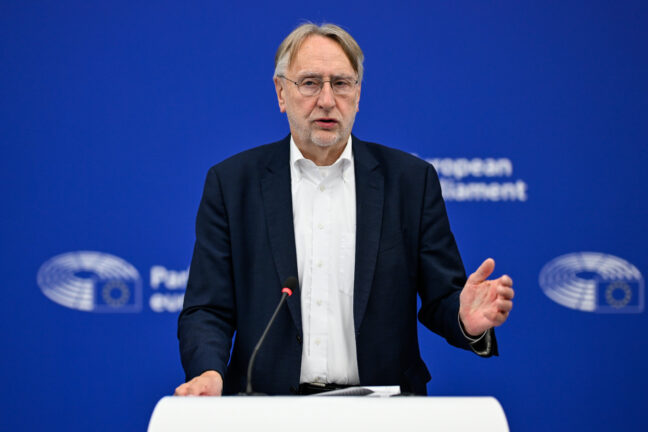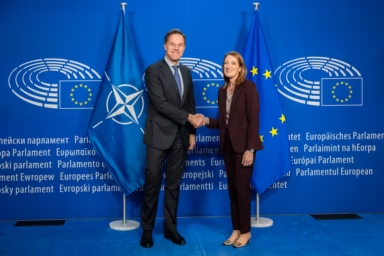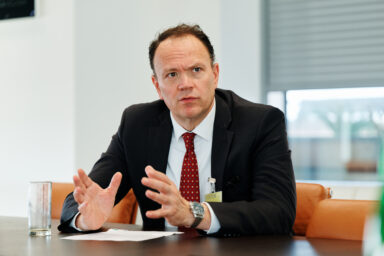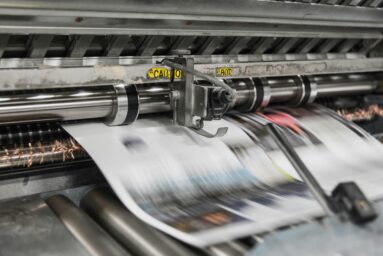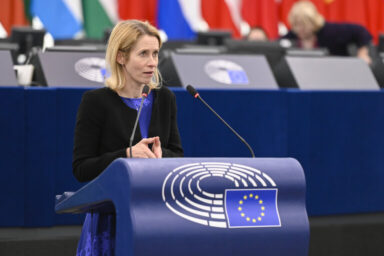Bernd Lange, ranking German Socialist MEP, has sharpened his critique of the agreement governing the Union’s trade with the United States. In a combative press conference ahead of an extraordinary committee meeting, he derided the deal as procedurally flawed and substantively hollow.
MEP Bernd Lange (S&D/DEU), who chairs the European Parliament’s International Trade Committee (INTA), has emerged as a vocal institutional sceptic of the EU’s nascent trade deal with the United States. He dissected the agreement’s procedural irregularities and substantive shortcomings with the precision of a veteran legislator—and the frustration of a pragmatist watching geopolitical imperatives eclipse economic logic.
Not normal negotiations
His critique paints the deal as a hasty political fix that risks undermining Europe’s trade principles, industries, and global credibility. “We have clear confidence that trade policy is now based on democratic decision,” Mr Lange declared, framing his objections as a defence of due process against backroom dealmaking.
The pact, negotiated bilaterally by European Commission President Ursula von der Leyen and US counterparts, bypassed standard procedures—including a formal mandate from member states and parliamentary oversight. “These were not normal negotiations,” he noted, quoting a Commission director-general’s recent admission.
For Mr Lange, this departure from protocol matters. As INTA chair, he insists that even irregular talks require “a minimum of democratic participation and control”. The deal’s unveiling at a Scottish hotel—a setting US officials likened to historic accords like Bretton Woods—draws his particular scorn. “World order of trade are built in hotels…No, that’s not true. We are sticking to a fair partnership and a rule-based order.”
You might be interested
No security or predictability
Substance, however, troubles him more than symbolism. The Commission billed the agreement as a truce offering “security and predictability”. This came after years of Trump-era tariffs and Biden’s Inflation Reduction Act subsidies. Reality, says Mr Lange, has mocked this promise.
Two weeks after the deal’s announcement, the US expanded steel and aluminium tariffs to cover 407 products. These include wind turbines, motorcycles, and pumps. “Pumps…are really now covered with 50 per cent,” Mr Lange observed. He noted that European manufacturers face steeper US duties even as the EU prepares to eliminate tariffs on American imports.
I can’t explain why we should give zero tariff-free quotas to the US and not to Global South countries. — MEP Bernd Lange (S&D/DEU), EP international trade committee chair
Days later, the US Trade Representative threatened semiconductor export curbs on countries enforcing digital taxes. The move squarely targets the EU’s incoming Digital Services Act. “There is no security and predictability,” Mr Lange concluded. “A lot of questions will be raised to the Commission.”
Arbitrary quotas
The deal’s terms perplex him. The EU’s offer of zero tariffs on US industrial goods—motorbikes included—ignores asymmetric risks. European producers are already grappling with 15 per cent base US tariffs. Now, they face up to 50 per cent under the expanded metals levies. “Why should we give zero tariffs for US motorbikes,” the MEP asked. “Particularly when European producers have to pay…up to 30 per cent?”
Agricultural quotas—3,000 tonnes of bison beef, 500,000 tonnes of nuts—strike him as arbitrary. “Nobody knows who set the quotas. Is it created by the European Commission? Is it created by the USDA?” The lack of an impact assessment heightens his distrust. He fears these figures, “from the sky”, could undercut the EU’s delicate Mercosur ratification talks, where agricultural access remains a flashpoint.
You can’t dictate companies to invest…This is really a risky situation. — Bernd Lange
The pact’s incompatibility with World Trade Organisation (WTO) rules gnaws at Mr Lange, a self-described “defender of the multilateral trade order”. By granting the US exclusive tariff cuts and quotas, the EU violates the Most Favoured Nation (MFN) principle—a cornerstone of global trade fairness. “I can’t explain why we should give zero tariff-free quotas to the US and not to Global South countries,” he said, warning of reputational damage. Amendments to restore WTO compliance will top his agenda. “This is a clear undermining…we lost a lot of credibility.”
‘Fantastical‘ commitments
Energy commitments embedded in the deal—a pledge to buy $750bn of US LNG, oil, and nuclear fuels over three years—strike him as fantastical. EU firms currently purchase around $100bn annually; the target implies tripling imports. “I have my doubts if the capacity in the United States…is given,” he said, citing warnings from US suppliers. The linked $600bn investment pledge—a bid to redirect European capital stateside—he dismisses as “not thinkable”. “You can’t dictate companies to invest…This is really a risky situation.”
Mr Lange’s scepticism extends to the deal’s geopolitical framing. While some argue it shores up transatlantic unity against Russia and China, he counters that weakness invites exploitation. “Are we weak because we have no possibilities to defend ourselves and support Ukraine? That’s a real question.”
Rather than trading concessions for security, he advocates EU defence autonomy—a theme he expects Commission President von der Leyen to address in her State of the Union speech. “A stronger approach would lead to different outcomes,” he mused, alluding to missed opportunities.
Solidarity with Mercosur partners
The Mercosur agreement, by contrast, embodies Mr Lange’s vision of values-driven trade. Including Paris Agreement clauses—a first in EU trade deals—it allows suspension if signatory countries miss climate targets. “Failure…could lead to partial or total withdrawal,” he said, stressing mutual accountability.
Some companies can close their factories immediately (if the EU-US deal proceeds). — Bernd Lange
After 23 years of talks, he urges swift ratification. “It will be a wonderful Christmas gift for the world…to demonstrate trade can be based on democratic structure, participation, and confidence.” The deal also counters US unilateralism; he cites Washington’s 50 per cent steel tariffs on Brazil as reason to “give solidarity” via Mercosur.
Parliament’s role now pivots to damage limitation. While the Commission urges swift approval, Mr Lange vows amendments to shield industries and uphold WTO norms. “We want to reach the best for the economy and the people in Europe,” he said, citing imperilled pump manufacturers facing 50 per cent US tariffs. “Some companies can close their factories immediately” if the deal proceeds unaltered. Amendments could link tariff cuts to reciprocal US concessions, cap risky energy purchases, or revise opaque quotas. “Let’s see in three, four months what’s on the table,” he said, pledging a “normal process” devoid of haste.
Countermeasures are ready
Critics frame the choice as between a flawed deal and a trade war. Mr Lange rejects this binary. The EU had “countermeasures ready” and “scenarios” for a tougher response, he notes, implying von der Leyen’s team folded too quickly. “This was not my way…We have to deal with the result.”
His task: exploit the Parliament’s veto power to extract improvements. “We did it in the past,” he said, referencing the bloc’s 2012 rejection of the Anti-Counterfeiting Trade Agreement (ACTA). While loath to kill the deal, he’ll push for terms that “discriminate least” against the Global South and EU industry.
The coming months will test Mr Lange’s balancing act. As INTA chair, he must reconcile procedural purism with realpolitik—a challenge compounded by election-year pressures in Europe and the US. His allies fret that amendments could unravel the fragile truce; critics accuse him of tilting at windmills. Yet for Mr Lange, the stakes transcend tariffs. “This is not the reality of a modern democratic society,” he said of leader-led dealmaking. “We have to look…what is the effect for the people.” In an era of transactional diplomacy, that principle-first approach may prove his toughest sell.
The matter awaited an extraordinary INTA meeting that Mr Lange summoned for today (Wendesday, 3 September) afternoon.
